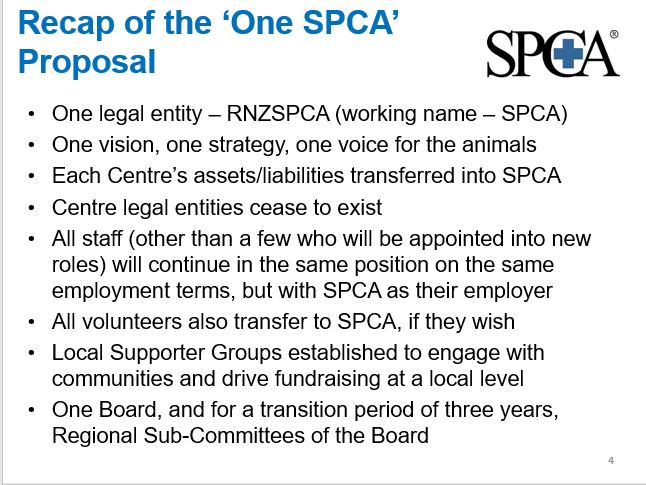 The SPCA is voting on the One SPCA concept this week this is their power point
The SPCA is voting on the One SPCA concept this week this is their power point
One SPCA Regional Meetings Master All Centres
Neil Wells has worked hard over the years to change the structure of the SPCA ,
in a job application he proudly states
this was just prior to drafting the animal welfare act and in the act provided only for the RNZSPCA to have the ability to employ inspectors . His intent appeared to be that he would be training the inspectors and thus have control over enforcement and provide himself with $$$$ .
That was phase one they are now working on Phase 2
Over the past few years he has been amalgamating SPCAs and when he became chair man of te Kuiti he set about changing the name of the SPCA see The significance of a name change Te Kuiti RNZSPCA or King Country SPCA.
Central King Country SPCA and the Te Kuiti Branch of the RNZSPCA fact or fiction
Te Kuiti Branch of the RNZSPCA committee resigns
In the brief time that Wells was chairman of the Te Kuiti SPCA he purchased a building . this property has now been sold at an apparent loss .
the interesting thing is that he purchased it from his neighbours Wells lives at 1308 and the previous owners of the building live at 1338 

see title documents here Comprehensive Title and Transaction Report
The previous owners were Sstjnr Limited owned by Steven Henry RICKARDS and Sarah Edith RICKARDS
We have to question how it was sold as the local Te Kuiti branch appears not to have had any involvement. No meeting of the members was called when the chair walked out , the RNZSPCA simply walked in and took over
Why is it so dangerous for the spca to have control.
Look at the legislation which Neil wells advised on and drafted.
the concern of the attorney general with the first bill was that it infringed on the bill of rights see here
the new legislation now states
13Strict liability
(1)In a prosecution for an offence against section 12, it is not necessary for the prosecution to prove that the defendant intended to commit an offence.
(1A)In a prosecution for an offence against section 12 committed after the commencement of this subsection, evidence that a relevant code of welfare was in existence at the time of the alleged offence and that a relevant minimum standard established by that code was not complied with is rebuttable evidence that the person charged with the offence failed to comply with, or contravened, the provision of this Act to which the offence relates.
(2)Subject to subsection (3), it is a defence in any prosecution for an offence against section 12 if the defendant proves—
(a)that, in relation to the animal to which the prosecution relates, the defendant took,—
(i)in the case of an offence against section 12(a), all reasonable steps to comply with section 10; or
(ii)in the case of an offence against section 12(b), all reasonable steps to comply with section 11; or
(iii)in the case of an offence against section 12(c), all reasonable steps not to commit a breach of section 12(c); or
(b)that the act or omission constituting the offence took place in circumstances of stress or emergency, and was necessary for the preservation, protection, or maintenance of human life; or
(c)that there was in existence at the time of the alleged offence a relevant code of welfare and that the minimum standards established by the code of welfare were in all respects equalled or exceeded.
(3)Except with the leave of the court, subsection (2) does not apply unless, within 7 days after the service of the summons, or within such further time as the court may allow, the defendant has delivered to the prosecutor a written notice—
(a)stating that the defendant intends to rely on subsection (2); and
(b)specifying—
(i)where the defendant intends to rely on subsection (2)(a), the reasonable steps that the defendant will claim to have taken; or
(ii)where the defendant intends to rely on subsection (2)(b), the circumstances of stress or emergency, and the reasons why the act or omission was necessary for the preservation, protection, or maintenance of human life; or
(iii)where the defendant intends to rely on subsection (2)(c), the relevant code of welfare that was in existence at the time of the alleged offence, and the facts that show that the minimum standards established by that code of welfare were in all respects equalled or exceeded.
Section 13(1A): inserted, on 19 December 2002, by section 4 of the Animal Welfare Amendment Act 2002 (2002 No 53).
This means that an inspector can make allegations based on their opinion and unless you file a defence within 7 days you are guilty
No other legislation in New Zealand has such a draconian provision , this is legislation written to provide $$$$$$$$
Leave a Reply